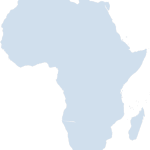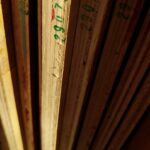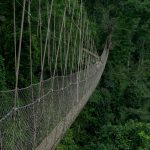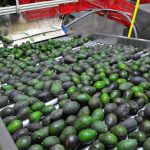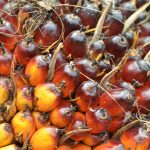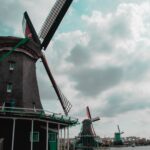
Operators across the regional have signalled a significant weakening of demand in international markets. Some mills servicing the Chinese market have temporarily ceased operations due to falling Chinese timber imports, others, have pivoted production to species in demand in the EU notably azobe for the Dutch market and timbers such as padouk for Belgium, agba for Portugal and bahia for Italy.
As of June 2024, there were 6.73 million ha. of MTCSPEFC certified forests in 36 certified natural forest units (FMUs) and nine certified forest plantations (FPMUs). There were 362 companies holding MTCS-PEFC certificates for Chain of Custody. MTCC statistics show that in 2023
Japan maintained its position as the leading importer of timber products certified under MTCS, totaling 102,630 cu m. followed by the Netherlands with United Kingdom, Australia, Belgium and France among the top importers.
Total exports increased by 7.4 % from 244,946 cu m in 2022 to 264,240 cu m in 2023 with plywood, sawnwood and mouldings remaining the major exported certified products. MIS_16-31_July2024.pdf (itto.int)
Dutch authorities have arrested two business owners, who are now accused of smuggling Russian timber into the EU via China.
The arrests were made by the FIOD—the Netherlands’s Fiscal Information and Investigation Service—responsible for investigating financial crimes and comes amid an EU-wide crackdown on conflict timber that continues to circumvent sanctions placed on Russia’s forest supply chain.
In a media release supplied by FIOD, the accused – a man (73) and woman (46) – will be tried under the Netherlands Sanctions Act and the Economic Offences Act – which could lead to a jail sentence.
Netherlands investors in Ghana, through the Ghana/Netherlands Business and Culture Council (GNBCC), have asked for ‘deepened digitalisation’ in public service to address their exposure to corrupt practices in the sector. “Bureaucratic interference” and firms paying extra costs through “unofficial channels” is considered a problem contributing to the high cost of doing business in Ghana that is discouraging to investors.
An investigation by the European Commission has confirmed the circumvention of anti-dumping duties by firms buying plywood from Turkey and Kazakhstan. The investigation found evidence of laundering of finished Russian plywood – a breach of EU sanctions put in place following the Ukraine invasion.
Inspectors also confirmed Turkish and Kazakh firms are using Russian raw materials to make birch ply for sale in Europe. The European Commission investigation found evidence of plywood made in Russia being simply laundered and re-labelled as of Kazakh or Turkish origin, something which should be of interest to authorities tasked with enforcing EU sanctions, both at EU and Member State level. Though not covered by sanctions, these sales are in clear breach of the EU Timber Regulation (EUTR), a law meant to halt illegal wood use in Europe.
Today Earthsight, which submitted evidence to the EU’s investigation, has filed EUTR complaints pertaining to 31 firms across nine member states whose suppliers were confirmed by the EU to be using Russian raw materials.
Criminal gangs are increasingly infiltrating legitimate business sectors such as trade, and importing more illegal products into the Netherlands, police research bureau Politie & Wetenschap has warned in its latest report.
The researchers found that the trade in avocados, plastic waste and timber are particularly prone to criminal infiltration and gangs earn money by circumventing local and international rules and regulations.
Parts of the avocado trade in Mexico, Peru, Colombia and Chile are also being taken over by gangs, the report said. Extortion, theft from local avocado farmers, and illegal slash and burn practices to obtain more land to grow avocados are rife.
Fair Finance Guide Netherlands has published a new report analysing the financial links between Dutch financial institutions and 18 key players in the Institute Pensar Agro (IPA) and the agribusiness lobby in general. In the period 2019 – 2023, the three major Dutch banks Rabobank, ABN Amro and ING Group have provided US$ 1.89 billion in financing to these 18 key agribusiness players.
This report by Global Witness shows how the 20 biggest banks in the EU have provided billions to companies linked to deforestation since 2016. This review shows that voluntary guidelines and individual commitments by financial institutions are unlikely to stop the financing of forest destruction.
Despite its “zero tolerance” policy, Rabobank provided at least 750 loans to farmers in Brazil who have been classified as illegal deforesters by the national environmental authority, Financieele Dagblad reports based on extensive data research done in collaboration with the NGO Reporter Brasil. The farmers funded by Rabobank were punished by environmental authority Ibama for deforesting a total of 84,000 hectares – the same as the area of all industrial estates in the Netherlands, FD reports.
The Netherlands is Europe’s largest importer of deforestation-linked products with a surge in wood and wood-based products from China and Brazil. The Dutch are the largest importer of soy, palm oil and cocoa and, most significantly, the region’s second-largest importer of wood products. Of the total imports that transition through the port, 28% are re-exported abroad, 33% are traded into European markets after processing, and 39% remain in the country for direct consumption or secondary processing.
As a result of its place in the global trade, the government of Netherlands has been urged by some producer countries to push back on the EUDR.
Deforestation Inc. reporters in a dozen countries investigated weak government efforts and loopholes allowing companies to keep trading Myanmar teak, a natural resource controlled by the military junta.
The Deforestation Inc. investigation by ICIJ and its 39 partners found that timber traders in three continents have continued to import Myanmar teak by the ton to supply shipbuilders and furniture manufacturers around the world, while consumers may be unwittingly financing the junta’s repressive campaign.
The reporters visited boat shows in Fort Lauderdale, Amsterdam and Paris to learn about the international teak market. They interviewed timber traders in 11 countries and pored over documents leaked from Myanmar’s tax agency and shared with ICIJ by Justice for Myanmar, a human rights group, U.K.-based news outlet Finance Uncovered and Distributed Denial of Secrets, a data transparency group.
********
Cases from Slovenia, Croatia, USA, Italy, the Netherlands, Germany, New Zealand, Turkey, Taiwan, France, and India are included.
According to this blog from the Environmental Investigative Agency (EIA), details of the convictions of one company and two individuals at the District Court of Amsterdam on 12 December 2022 have only recently been released in public court documents, with their names redacted, which confirm criminal convictions for importing teak from Myanmar into the Netherlands via the Czech Republic in breach of the EU Timber Regulation (EUTR) Article 4 and 6 due diligence provisions.
In 2018, the NVWA issued a warning to one of the Dutch companies involved which had been importing Myanmar teak into the Netherlands. The NVWA determined that, as the economic operator, its due diligence system for its imports of Myanmar teak failed to meet the due diligence obligations of the EUTR.
In response, according to an investigation carried out by the Dutch Prosecution service, the now-convicted directors set up a company, Fairwind Trading sro, in the Czech Republic and then transferred orders of Myanmar teak to this entity to avoid the detection of NVWA – while implemented the rejected due diligence system.
Click here to access the Global Illegal Logging and Associated Trade (ILAT) Risk assessment tool and to download the Forest Trends User Guide describing the functionality of the ILAT Risk Data Tool.
Click here to access the Cattle Data Tool.

